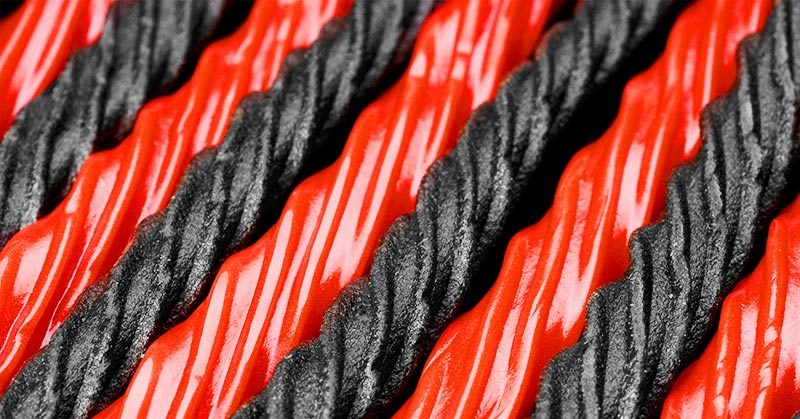It is common knowledge that eating copious amounts of candy is not good for your health. Large amounts of sugar can cause dental caries, lead to blood sugar problems, and weight gain. It turns out, however, that some types of candy have a few more consequences than others.
Black licorice has been a popular sweet treat for decades, but it seems eating too much of it will give you more than just a cavity. One man who consumed massive amounts of the black candy every day, actually died, and doctors blamed his licorice habit.
Man Dies from Licorice Habit
A construction worker from Massachusetts was eating about a bag-and-a-half of black licorice every day. Despite showing no symptoms, the 54-year-old dropped dead of a heart attack suddenly at a fast food restaurant.
Doctors learned that the man had a poor diet, and that he ate a lot of candy. They decided to investigate further to see if this was the cause of his sudden death. They found out that just a few weeks before he died, he had switched from the red, fruit-flavored knd, to another type made with black licorice.
Licorice contains an active ingredient called glycyrrhizic acid. In moderate amounts, it is generally safe to consume. In large amounts, however, it can cause hypertension, metabolic alkalosis, fatal arrhythmias, and renal failure. It can also cause hyperkalemia, which is when the potassium levels in your blood drop dangerously low.
All of these symptoms were seen in this patient. For this reason, doctors concluded that the licorice was what caused the patient’s death. Dr Andrew L Lundquist wrote in the report:
“Further investigation revealed a recent change to a liquorice-containing candy as the likely cause of his hypokalemia.” [1]
Licorice in Medicine
Licorice, otherwise known by its Latin name, Glycyrrhiza glabra, has been used in food and medicine for thousands of years. Both Eastern and Western medicine has used licorice to treat a variety of illnesses, including the common cold, peptic ulcers, eczema, indigestion, and even kidney disease [2].
Licorice can help sooth a sore throat, and help to get rid of phlegm. It is still used for many of these conditions today, however there is not scientific evidence to support all of its uses. The following are some purported uses for licorice root:
- Treatment for bronchitis and chest congestion
- Relieves constipation
- Treatment for gastrointestinal disorders (like peptic ulcers)
- Treatment for hepatitis
- Reduces inflammation
- Relieves symptoms of menopause
- Treatment for microbial infections
- Treatment for prostate cancer
It is important to note that there is a lack of definitive evidence to support the use of licorice in any of these scenarios [3].
Side Effects of Licorice
While licorice may have some beneficial uses, it should also be used with caution. This is particularly true if you are taking it in the form of an extract.
Licorice contains the compound Glycyrrhizin. When you consume pure licorice extract, your body can absorb it very easily and in high quantities. One notable side effect of this compound is that it reduces testosterone and increases the amount of cortisol circulating in your blood.
These effects depend on how much licorice extract you take, and will reverse once you stop taking the product. That being said, many people may want to avoid taking licorice extract for this reason [4].
Other possible side effects of licorice extract may include:
- High blood pressure
- Lethargy
- Muscle pain
- Cardiac arrhythmias
- High sodium retention
- Low blood levels of potassium
- Decreased libido in men
- Suppression of scalp sebum secretion
- Low blood platelet count
- Hypertensive retinopathy
- Hypertensive nephropathy
- Licorice has been associated with intracranial hemorrhagic stroke and cerebral microbleeds
- Excessive intake of licorice triggered a case of carpal tunnel syndrome
- A systematic review showed an association between heavy licorice use and early preterm births [3].
Licorice extract may also interfere with certain medications, including insulin, metformin, antihypertensives, MAO-inhibitors, and several others. Talk to your doctor before taking licorice extract to ensure that it is safe for you to use [3].
Is Licorice Safe to Eat?
It is important to keep in mind that all of the side effects typically only occur if you are taking licorice in a more concentrated form, like an extract. If you enjoy black licorice as an occasional treat, you can continue to do so safely.
It is also important to note that many “licorice” or “licorice-flavored” products in the United States don’t actually contain any licorice. Instead, they use anise root, which provides the same smell and flavor.
In addition, you can find licorice root supplements in which the glycyrrhizin has been removed. These products are called deglycyrrhizinated licorice (DGL).
That being said, the FDA says that if you’re over the age of forty, two ounces of black licorice per day for at least two weeks could land you in the hospital. For this reason, the organization has published some guidelines for how to consumer the treat safely:
- No matter what your age, don’t eat large amounts of black licorice at one time.
- If you have been eating a lot of black licorice and have an irregular heart rhythm or muscle weakness, stop eating it immediately and contact your healthcare provider.
- Black licorice can interact with some medications, herbs and dietary supplements. Consult a health care professional if you have questions about possible interactions with a drug or supplement you take [5].
The FDA also recommends that if you’ve experienced any problems after eating black licorice, to contact the FDA consumer complaint coordinator in your area.
Keep Reading: Elderly Man Dies Years After Young Girl’s Friendship Saved Him
- https://www.bbc.com/news/world-us-canada-54269144
- https://pennstatehershey.adam.com/content.aspx?productid=107&pid=33&gid=000262
- https://www.mskcc.org/cancer-care/integrative-medicine/herbs/licorice
- https://examine.com/supplements/licorice/
- https://www.fda.gov/consumers/consumer-updates/black-licorice-trick-or-treat

